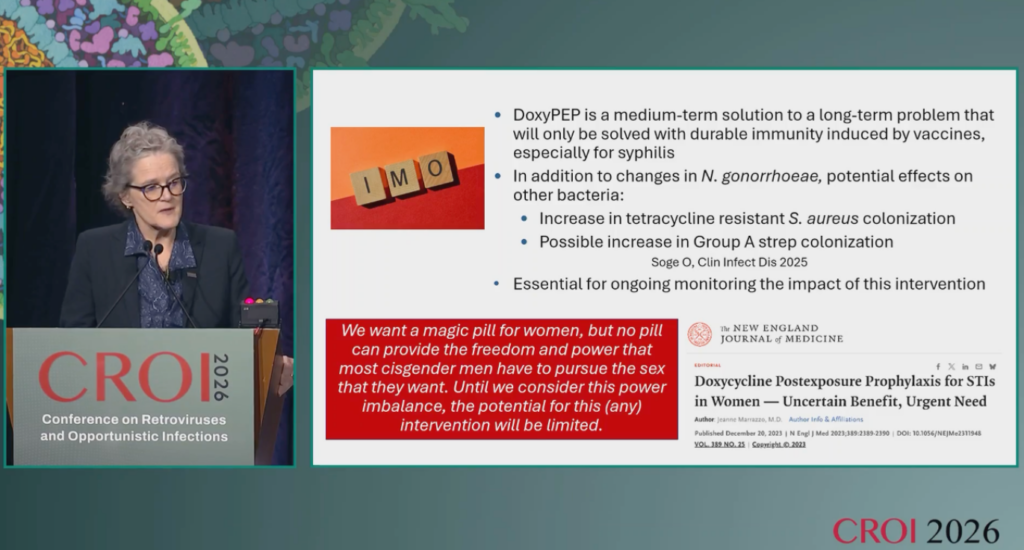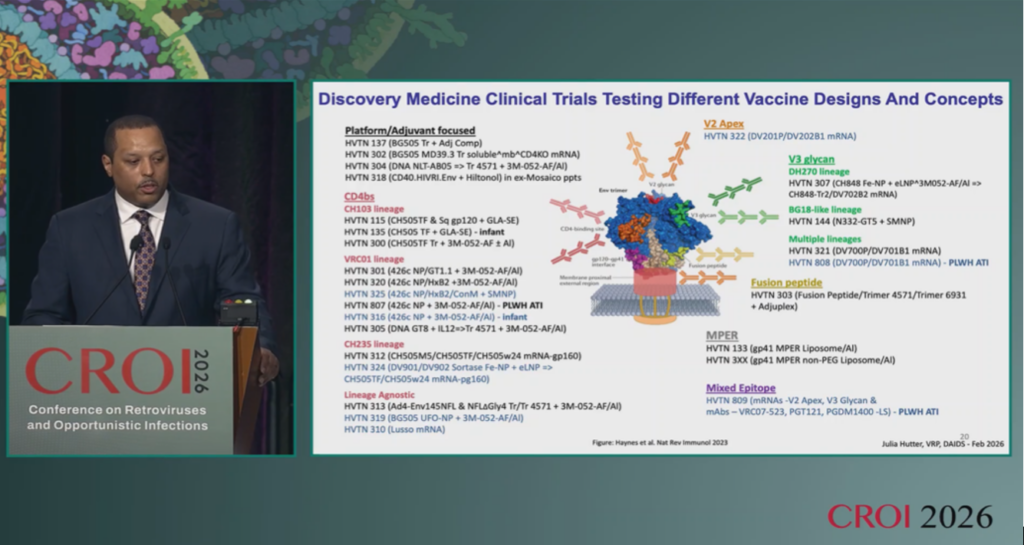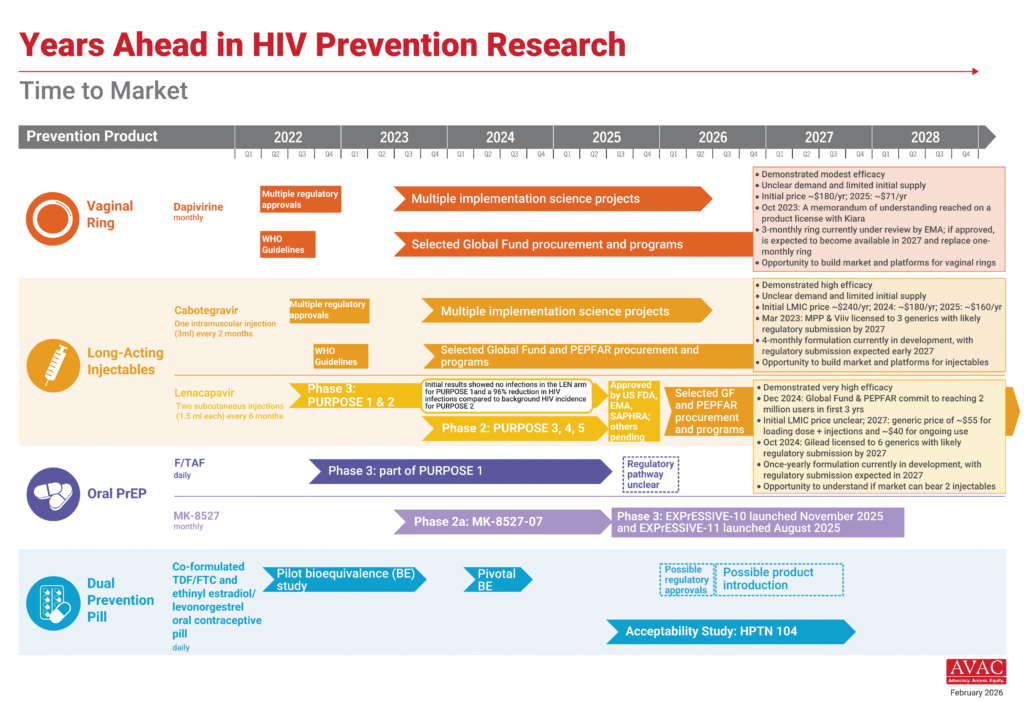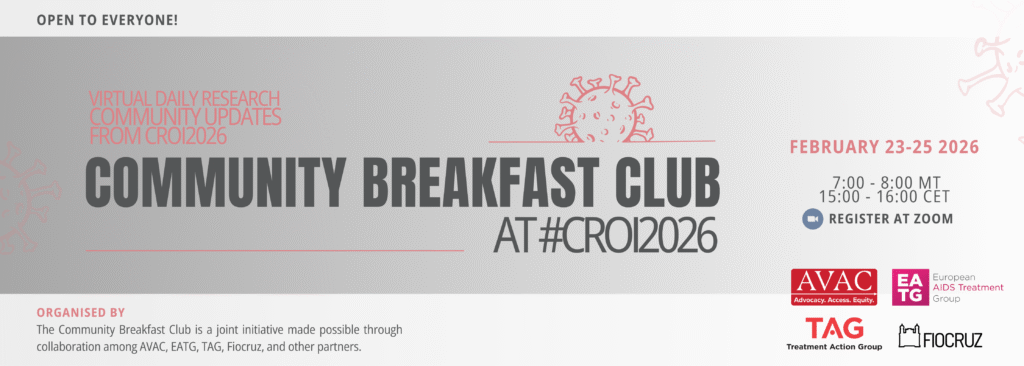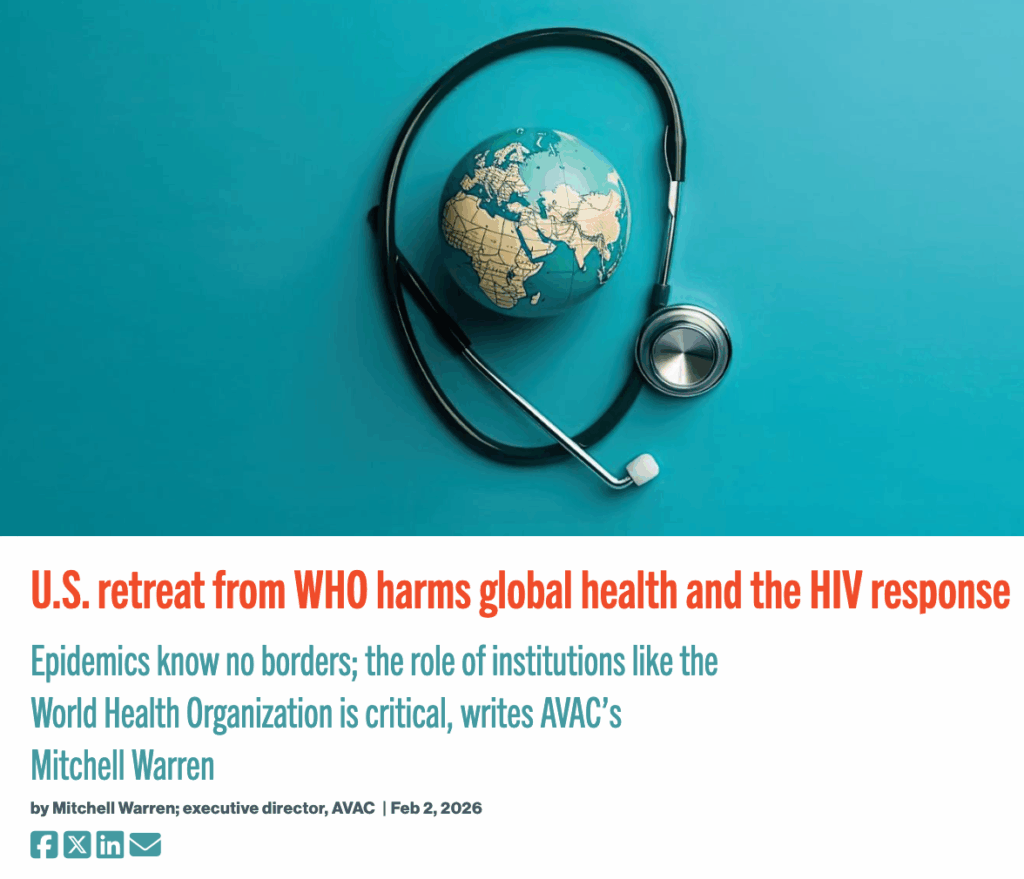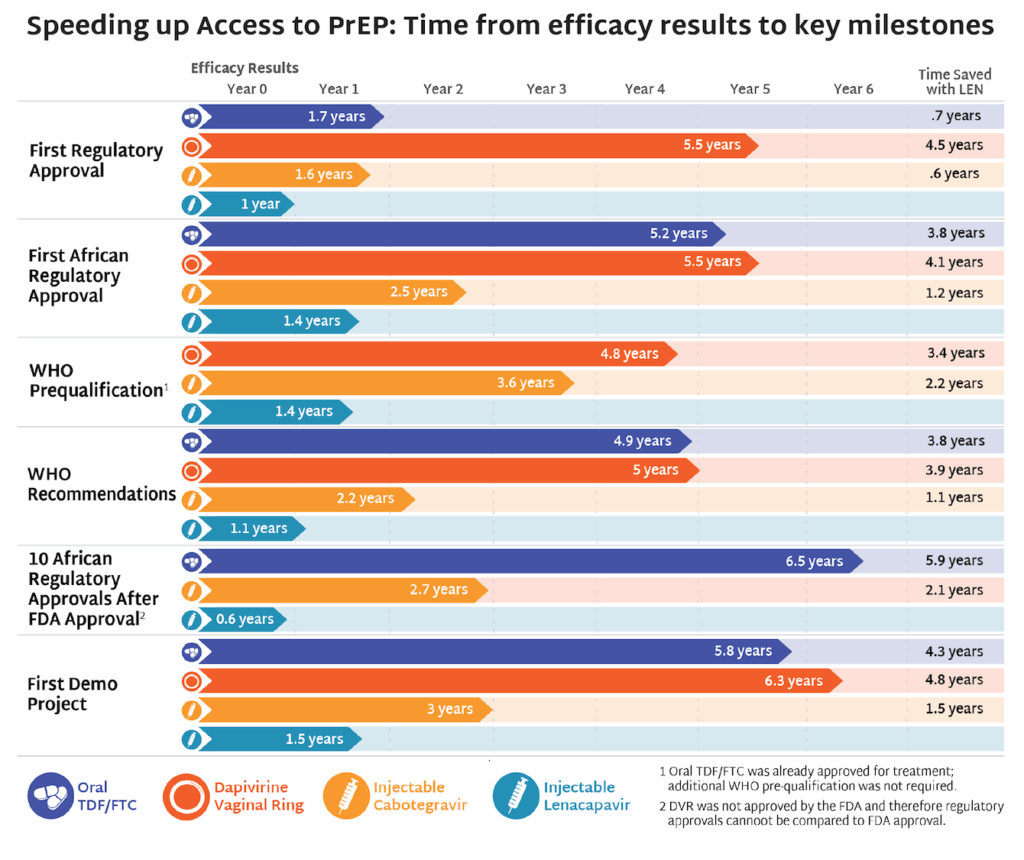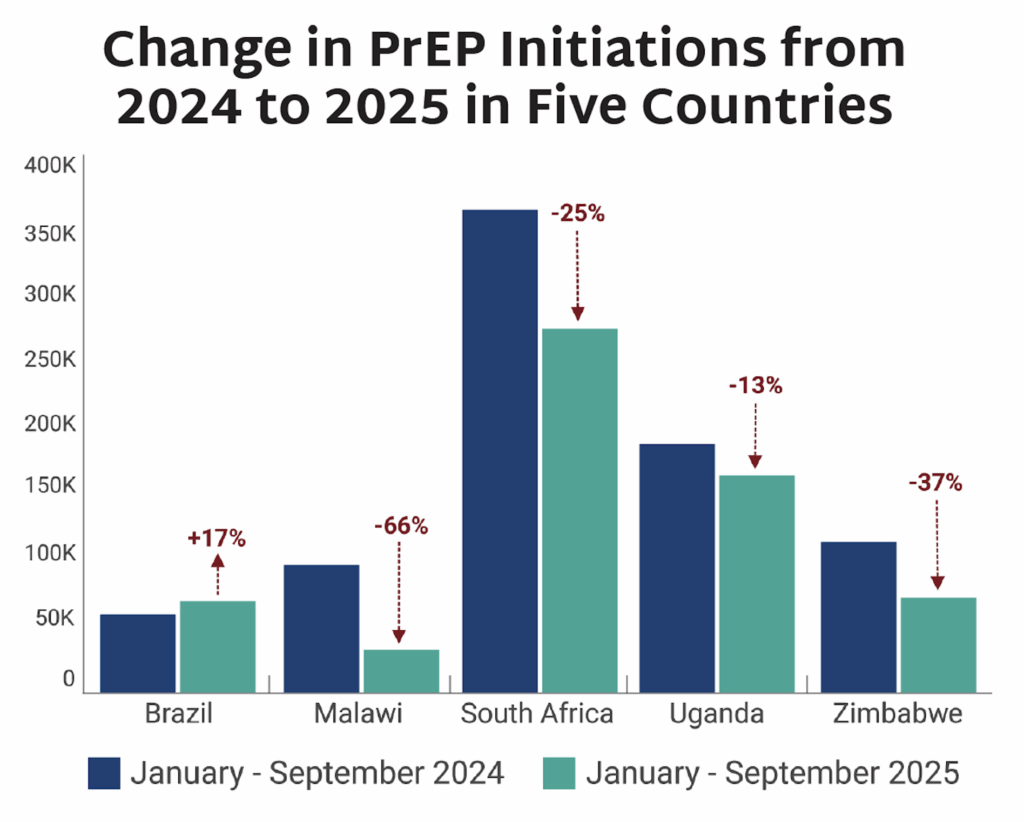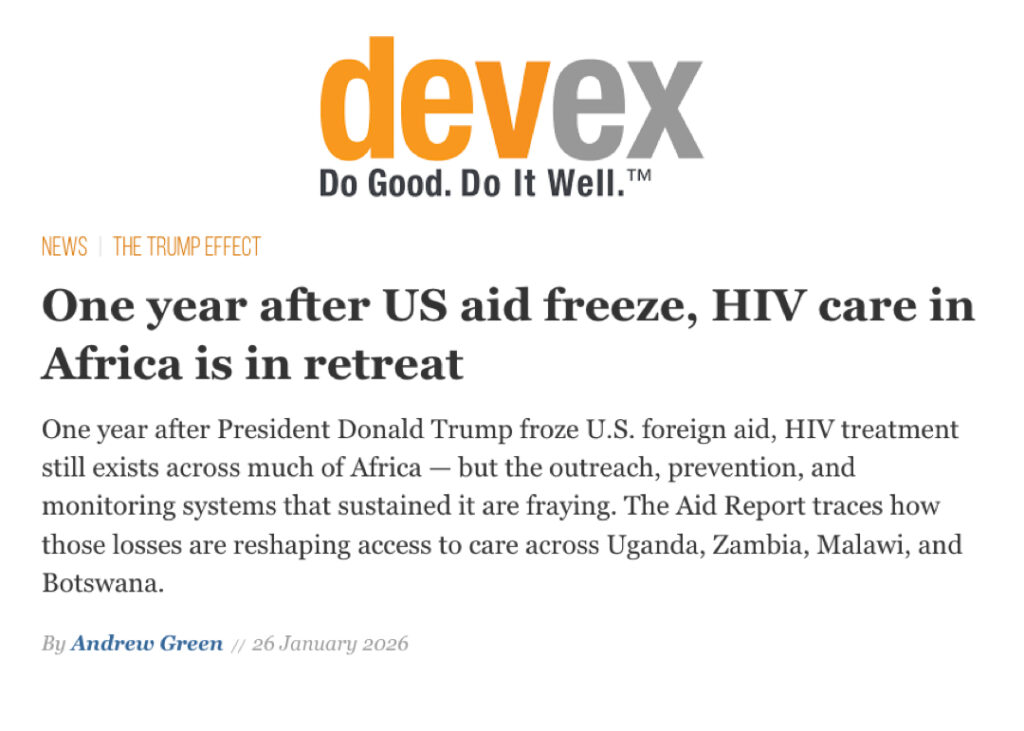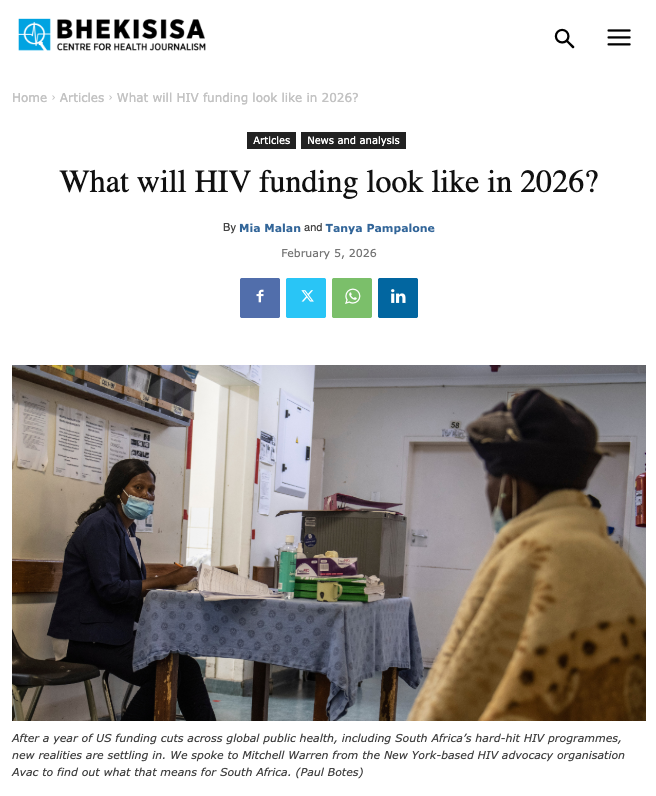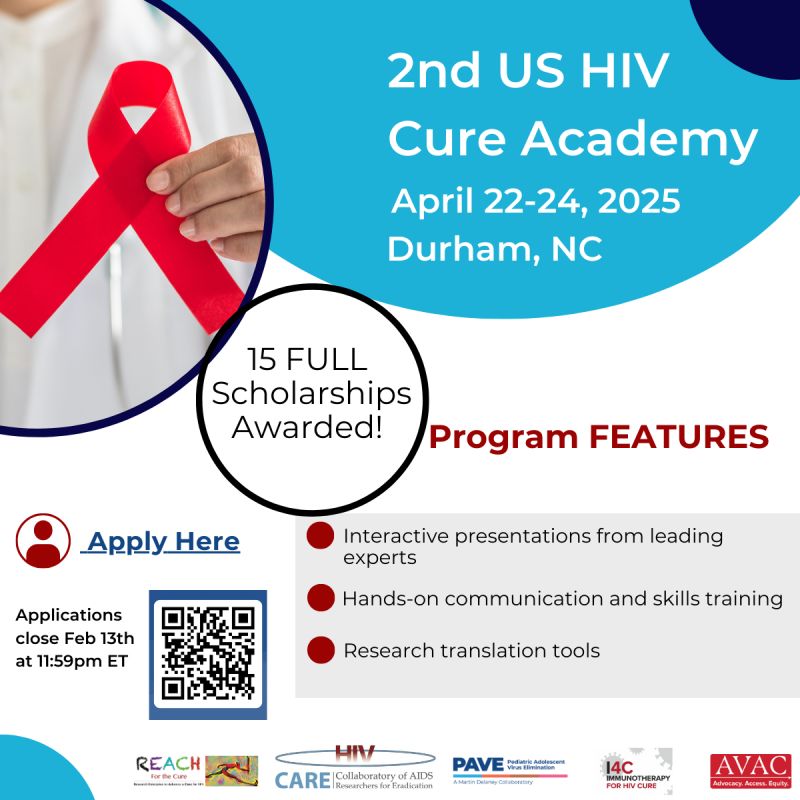This week’s issue covers Zimbabwe’s decision to halt negotiations on its Memorandum of Understanding with the US for global health funding; new domestic funding in South Africa; a new investment case for US funding for the Global Fund; the launch of injectable lenacapavir for PrEP (LEN) in Kenya and Zimbabwe; and key takeaways from CROI 2026 on the links between science, funding, and delivery.
Zimbabwe Declines US Health MoU, Zambia May Follow
This week, the government of Zimbabwe formally terminated negotiations on the proposed Memorandum of Understanding (MoU) with the United States under the America First Global Health Strategy. In a public clarification, Zimbabwe’s Secretary for Information, Publicity and Broadcasting Services, Nick Mangwana, said the government’s decision followed an inter-ministerial review and reflected concerns that the draft agreement did not reflect an equitable partnership. While acknowledging the historic role of US health assistance, including PEPFAR, the government cited risks to data sovereignty and misalignment with Zimbabwe’s commitment to ongoing negotiations on the WHO Pathogen Access and Benefits Sharing (PABS) mechanism under Pandemic Agreement adopted last year. “Zimbabwe was being asked to share its biological resources and data over an extended period, with no corresponding guarantee of access to any medical innovations—such as vaccines, diagnostics, or treatments—that might result from that shared data,” Mangwana wrote. “In essence, our nation would provide the raw materials for scientific discovery without any assurance that the end products would be accessible to our people should a future health crisis emerge. The United States, meanwhile, was not offering reciprocal sharing of its own epidemiological data with our health authorities.”
Other countries are also taking critical reviews of their MoUs: Kenya’s MoU is suspended pending a court challenge. Zambia is reported to have rejected its agreement as well. A leaked draft has drawn criticism for containing weaker protections and more onerous terms than other agreements.
IMPLICATIONS: These developments, along with the abrupt withdrawal of other forms of US humanitarian assistance from seven African countries, raise serious questions about the power dynamics embedded in the new bilateral approach. For many governments, the choice may not be between partnership models, but between accepting unequal terms or losing support altogether, which puts health systems, sovereignty, and long-term equity at risk.
READ:
- Clarification on Zimbabwe’s Health Diplomacy —The Herald
- Protecting global health in the era of the America First Strategy—The Lancet Global Health
- US-Rwanda MoU for Health Records $1.5 billion in Soft Commitments from Private Investors—To End A Plague…Again Substack
- Zambia and Zimbabwe Back Away From ‘Prescriptive’ US Health Deals—Health Policy Watch
- Zambia joins the list of African countries rejecting the U.S. “strings-attached” health funds—Business Insider Africa
- The Trump Administration Is Ending Aid That It Says Saves Lives—The Atlantic
- US accused of ‘shameless exploitation’ over proposed Zambian health aid deal—The Guardian
- ZNNP+ Statement on the impact of the discontinuation of negotiations under the $350 Million U.S Health funding agreement on PLHIV in Zimbabwe—Zimbabwe National Network of People Living with HIV (ZNNP+)
- Public Health Doctors Call for Dialogue After Zimbabwe–US Health Funding Talks Stall—Zimbabwe Mail
- Zimbabwe rejects ‘lopsided’ US health aid deal over data concerns—BBC
South Africa Mobilizes Domestic Resources for HIV
Following the termination of USAID grants in South Africa, the country’s Finance Minister announced new domestic funding (R26 billion) to provinces for HIV programs, with an additional R410 million to be reprioritized from the national Department of Health over the medium term to offset research grant funding withdrawn by the US. The new allocation is intended to support core interventions, including prevention of mother-to-child transmission and continued access to treatment.
IMPLICATIONS: South Africa’s response underscores both resilience and vulnerability in the current global health landscape. While the government’s decision to mobilize domestic resources reflects strong political commitment and a recognition that HIV programs are essential services, it also highlights the scale of the gap left by abrupt external funding withdrawals.
READ:
New Investment Case for Global Fund
Following the conclusion of the Global Fund’s 8th Replenishment Conference last year, Friends of the Global Fight released a new FY2027 US Investment Case urging US Congress to appropriate funding in the fiscal year (FY) 2027 budget to protect hard-won gains against HIV, tuberculosis (TB), and malaria and to prevent further disruption to services already under strain. Advocates are calling on Congress to appropriate $1.533 billion for the Global Fund in FY27, or one third of the $4.6 billion US pledge for the 8th Replenishment. The investment case underscores the Global Fund’s role as a core pillar of global health security, highlighting its impact on saving lives, strengthening health systems, and advancing country-led responses.
IMPLICATIONS: This new call for continued US government investment comes just after the Global Fund fell short of meeting its $18 billion target and as the Board endorsed a shift toward a rolling, longer-term replenishment model, as well as greater emphasis on country transitions. Without predictable, robust donor commitments from public and private sectors, ambitions for achieving sustainability, methodical transition, and ending these three diseases will remain fragile.
READ:
- Global Fund fundraising shortfall hits country allocations—Devex
- Fiscal Year 2027 U.S. Investment Case for the Global Fund—Friends of the Global Fight
Lenacapavir for PrEP launches in Kenya and Zimbabwe Amid Uncertain Future for Access
This week marked a major milestone for the rollout of lenacapavir for HIV PrEP (LEN). Both Kenya and Zimbabwe held national launch events to mark the rollout of LEN in their countries. Kenya received its first 21,000 doses last Friday and announced at the launch that the Global Fund committed an additional Sh256 million (approximately $2 million) to support rollout activities, including service delivery support, training, community engagement and systems to ensure consistent access. Zimbabwe’s initial phase of the rollout, supported by PEPFAR and the Global Fund, is expected to reach approximately 46,000 people across 24 sites.
IMPLICATIONS: These rollouts mark major milestones, but the future sustainability of access remains unclear. Scaling LEN beyond this initial phase will depend on reliable financing, supply chains, health workforce capacity and long-term political commitment, all of which are under strain amid broader disruptions to global health funding. Zimbabwe’s decision to decline the MoU with the US underscores this fragility: with the transition to conditional, transactional bilateral health arrangements, access to public health tools (like LEN) risks becoming vulnerable to shifting geopolitical priorities, rather than being guided by data and public health need.
READ:
- Kenya to roll out game-changing HIV drug in March—Africa News
- Zimbabwe rolls out long-acting HIV drug, among first countries to do so—Associated Press
- Zimbabwe Rolls Out New HIV Prevention Drug Lenacapavir—Reuters
- Patient zero: The first Kenyans to receive the HIV injection—Daily Nation
- Global Fund pledges Sh256 million for Kenya’s Lenacapavir rollout—The Star
CROI 2026: Progress in HIV Science, Pressure on the Systems That Deliver It
The Conference on Retroviruses and Opportunistic Infections (CROI) 2026 convened this week in Denver with a clear and urgent message: scientific progress in HIV treatment, prevention, and cure cannot be separated from the global infrastructure, sustained funding, public trust, resilience, and activism needed to sustain it. Across three and half days, researchers, policymakers, regulators and advocates heard advances—from durable PrEP options like lenacapavir and MK-8527 to advances in treatment, cure and vaccine research. And critical questions on whether the world is willing and able to currently and eventually deliver these tools equitably and at scale. Speakers warned that funding cuts, dismantled programs, and political interference threaten infrastructures that took decades to build, stressing that the interruption of HIV research and delivery “is not a policy choice.”
IMPLICATIONS: As the science accelerates, CROI made clear that access, delivery, and trust are the main challenges. Data presented on service disruptions after the foreign assistance freeze, alongside warnings about threats to PEPFAR and global HIV infrastructure (read this new Lancet comment), underscored that breakthrough science and innovation mean little if systems fail to deliver them equitably and at scale. Community advocates emphasized that “country ownership” must be matched by activism, real-time data, and accountability that runs in both directions.
READ:
- CROI 2026: Science, Solidarity and High Stakes for the HIV Response—AVAC
- CROI 2026: Meaningful Progress, Expanding Choice—AVAC
- CROI 2026 Opens With Calls to Action—POZ
- Counting the costs of global HIV funding disruptions—aidsmap
- French study confirms efficacy of on-demand PrEP—aidsmap
- Dual immune modulators delay, but don’t prevent, HIV rebound after stopping antiretrovirals—aidsmap
- Very Early ART Initiation in Children With HIV Could Lead to ART-Free Remission—MedPage Today
- Learning From HIV, Building Better Infrastructure to Tackle STIs: Jeanne Marrazzo, MD, MPH—AJMC
What We’re Reading
- The Human Cost of Trump’s War on Science—New York Times
- What Happened in Chicago When Science Became the Enemy—New York Times
- More US Vaccine Contestation Ahead Amid Court Action and Senate Hearing for Trump’s Surgeon General Nominee—Health Policy Watch
- The Global Health Reform Debate’s Dangerous Blindspot—Think Global Health
- ‘We want to rebuild trust’: fired CDC workers form group to combat Trump’s war on science—The Guardian
- I Was a CDC Senior Leader. From What I Saw, No One Should Run Two Agencies.—MedPage Today
- Aid Cuts Are Not Leading to Reforms in Sub-Saharan Africa—CGD
- COVID’s origins: what we do and don’t know—Nature
- MFAN Releases Operational Roadmap to Deliver on the Promise of Government-to-Government Assistance—MFAN
- New U.S. Foreign Aid Emphasis on Government Partnerships is Encouraging — If Done Right—Just Security
- Philanthropy’s Response to HIV and AIDS: 2024 Grantmaking—Funders Concerned About AIDS
- The HIV/AIDS response as we knew it is over: Where do we go from here?—JIAS
